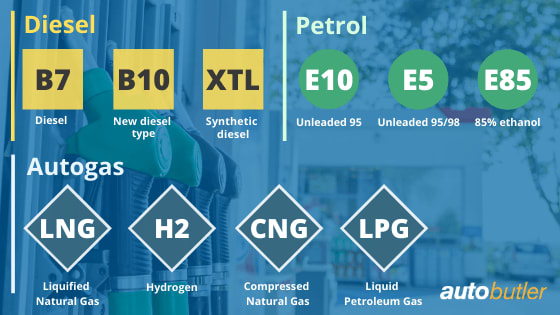
Fuel is essential for keeping your car running. However, the type of fuel your car needs will vary depending on its engine. Diesel, hydrogen, bioethanol... Sometimes it can be complicated to find your way around the many types of fuel - especially their differences and usage.
How do you know which fuel is best for your car?
Above all, it is important to know what type of fuel to choose at the petrol station. If you don’t, it can cause serious damage to your car’s engine. That’s why we’ve collected an overview below where you can find information on the many types of fuel available in the UK. If you don’t know what type of fuel your car needs, check out the car’s handbook, i.e. the vehicle owner’s manual.
What are the different types of fuels?
Following the harmonised set of fuel labels introduced in the EU in October 2018, you may be confused about some of the labels and names. Take a look below.

Diesel
Diesel has long been the preferred type of fuel because, in the long run, it is cheaper than petrol. There are three types of diesel fuels.
- B7 is the most widely used standard diesel. It contains a 7% bio component called fatty acid methyl ester (FAME).
- B10 iis a newer type of diesel that contains higher levels of biofuel – to a maximum of 10%. It has not yet been introduced in UK, but has been rolled out in France.
- XTL is a synthetic diesel, and is not derived from petroleum. Part of it comes from paraffin oil and gas.
Petrol
Like diesel, there are 3 main types of petrol. This type of fuel will always be indicated by an E in a circle (E for Ethanol).
- E5 corresponds to both SP95 and SP98 labels. It contains up to 5% bioethanol, a fuel made from agricultural feedstock like corn or other crops.
- E10 is a petrol type containing 10% bioethanol. It has not yet been introduced in the UK but will probably be rolled out in 2021.
- E85 contains 85% bioethanol. It’s not commercially available in the UK, but can be found across Europe - especially in France where it’s called Super Ethanol.
Autogas
- LNG stands for Liquified Natural Gas, and it’s particularly common for heavy vehicles.
- H2 means hydrogen. The advantage of this fuel is that it does not produce CO2. However, it costs a lot of energy to produce.
- CNG, or Compressed Natural Gas, is the same gas used to heat homes. It consists of methane stored under high pressure.
- LPG stands for Liquid Petroleum Gas. This fuel is a mixture of butane and propane.
What is the future of car fuels in the UK?
Before buying a car, it is important to learn more about the different fuels available, and which is compatible with the car. And, in the future, the landscape of fuel types might change, as newer mixtures of bioethanol take over the market and we move towards a more green future.
As more and more cars in Europe become compatible with greener fuels, the petrol in the UK might contain even more biofuel, working as a stopgap solution before we convert to a purely electric car fleet. As the government decided to ban the sale of all petrol and diesel cars by 2040, initiatives will have to be introduced to make this transition easier.






